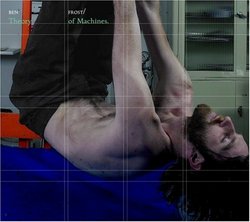| All Artists: Ben Frost Title: Theory of Machines Members Wishing: 1 Total Copies: 0 Label: Bedroom Community Original Release Date: 1/1/2007 Re-Release Date: 3/6/2007 Genres: Dance & Electronic, Alternative Rock, Special Interest, Pop, Rock Styles: Ambient, Electronica, Techno, Experimental Music Number of Discs: 1 SwapaCD Credits: 1 UPC: 859700053928 |
Search - Ben Frost :: Theory of Machines
 | Ben Frost Theory of Machines Genres: Dance & Electronic, Alternative Rock, Special Interest, Pop, Rock |
Larger Image |
CD Details |
CD ReviewsHeadphone Commute Review Headphone Commute | 12/07/2007 (5 out of 5 stars) "I can only describe Theory of Machines as ambient hardcore. Australian born Ben Frost builds walls of noise that rise steadily and slowly, and come crashing down on command. Now residing in Reykjavik, Frost exploits all of the extreme properties of sound. Psychologically raw, punishing, and overdriven guitars, with reverberated pads and rhythms mutate into the white noise and back, sending chills that originate deep from within the ear canal and slide down to the toenails. Frost often made me scratch my ear canal and occasionally get up to check the monitors that sounded blown out, emitting graceful static. Coming from a rock background, and being a member of a band called School of Emotional Engineering, Frost is not particularly interested in electronic music, and rather relies heavily on dark minimalism and industrial noise to compose truly one of the most interesting and irreversible memory imprints of the year." Distorted and lovely somethingexcellent | Lincoln, NE United States | 04/27/2007 (4 out of 5 stars) "When friends of mine kept recommending Ben Frost, I knew that it was an artist I should seek out (as my friends most often know more than I do), and after hearing his album Theory Of Machines, I'm glad that I did. The second release on the fledgling Bedroom Community label, it's also the third release from Frost, and finds him pushing even further into powerful audio explorations that sounds something like Tim Hecker with occasionally punishing rhythms. He examines textures and timbres in lovely, and sometimes disturbing ways over the course of five tracks and just under forty minutes, mixing pastoral beauty with gut-churning blasts in other places. The album-titled opener "Theory Of Machines" sets the tone with a super-slow build of filtered guitar that's almost crystalline in places. Eventually, slow-morphing sludgy bass enters the mix and the track builds to a powerful climax of screaming guitars and overdriven beats about two-thirds of the way through before melting into ambience again. "Stomp" follows, and takes a slightly different direction, with programmed beat thumps banging across a more barren landscape while distance waves of noise only creep into the foreground during a crunchy ending. "We Love You Michael Gira" conveys a similar sense of dread as many tracks on the album, and this time Frost pulls it off by again barely keeping waves of feedback under control for the first half of the track before letting loose with a repeating high tone (that resembles a medical device warning sound) and some beats that are absolutely coated in feedback and on the verge of breaking down. A string coda at the end of the song does nothing to lighten the mood. If the former track was barely-contained violence, then "Coda" is where things let loose with any pent up energy. The two-minute track is all scorching guitar noise, red-lined bass pulses, and hammering drums that finally blur out at the end. Given all that came before it, it seems only fitting that the closer of "Forgetting You Is Like Breathing Water" takes things down a great deal to warm repeated tones, filtered drones, and some subtle strings that sound something like a more layered version of the minimal pulse-tone work that Oren Ambarchi has mastered. Even though it's a shorter album, Theory Of Machines is by no means a light listen. With several moments that will make your hair stand up on end (both for sheer beauty and dread), this is definitely worth seeking out. (from almost cool music reviews)" Adventurous and very good Mr. Thistle | Salt Lake City, UT | 07/11/2007 (4 out of 5 stars) "Ben Frost constructs and then deconstructs ambient electronics. Theory of Machines' 5 tracks play as a narrative of teaming beauty and destruction and must be heard as a whole. Isolating single tracks is like reading random chapters out of a book, you loose their relevance without context. Frost's music is for machinery, for switchboards and factories, for oil consuming retrograde robot soldiers from the future. Yet with all this mechanics of it, Theory of Machines is not an industrial record. Frost's techniques are rooted in Fenneszian textures, The Wind-Up Bird's electronic blips and Michael Gira's pure sonic power. Frost's robots have pumping, bleeding hearts that flow to the surface after the chaos as in the album closer "Forgetting You is Like Breathing Water" where a beautiful string motif swells to its bursting point. Theory of Machines is power electronics of the most soaringly winning nature. Highly recommended for the adventurous."
|
